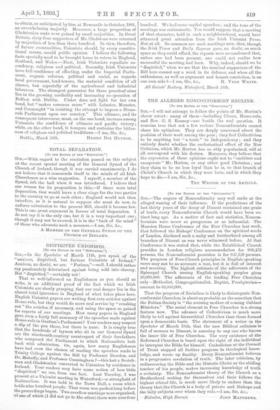[To THE EDITOR Or THE "SPECTATOR."] Sin,—The augurs of Nonconformity
may well smile at the alleged waning of their influence. If the predictions of the last thirty years of the decay of Dissent contained one grain of truth, every Nonconformist Church would have been ex- tinct long ago. As a matter of fact and statistics, Noncon- formists were never so prosperous or so influential. The Mansion House Conference of the Free Churches last week, that followed the Bishops' Conference on the spiritual needs of London, disclosed such a unity and brotherhood among all branches of Dissent as was never witnessed before. At that Conference it was stated that, while the Established Church provides in London religious accommodation for 908,478 persons, the Nonconformist provision is for 927,129 persons. The progress of Free-Church principles in English-speaking races may not be so accurate a test, but it is full of interest and meaning. The highest estimate of the adherents of the Episcopal Church among English-speaking peoples gives 20,000,000. The adherents of the leading Free Churches only—Methodist, Congregationalist, Baptist, Presbyterian— amount to 60,000,000.
That the progress of Socialism is likely to disintegrate Non- conformist Churches, is about as probable as the assertion that the Fabian Society is "the nursing mother of coming Cabinet Ministers." The social element in Free Churches is a strong feature now. The advance of Collectivism is much more likely to tell against hierarchical Churches than those formed upon a democratic basis. The statement of a writer in the Spectator of March 18th, that the new Biblical criticism is full of menace to Dissent, is amusing to any one who knows the inner life of Free Churches. The very existence of the Reformed Churches is based upon the right of the individual to interpret the Bible for himself. Catholicism at the Council of Trent stopped all further progress in theological know- ledge, and wrote up finality. Every Nonconformist believes in a progressive revelation of truth. The later criticism, by rediscovering the Bible and the Historic Christ as the abiding teacher of his people, makes increasing knowledge of truth a certainty. The Nonconformist theory of the Church as a Brotherhood seeking for themselves and their fellows the highest ethical life, is much more likely to endure than the theory that the Church is a body of priests and Bishops and the laity subjects over whom they rule.—I am, Sir, &c.,


































 Previous page
Previous page